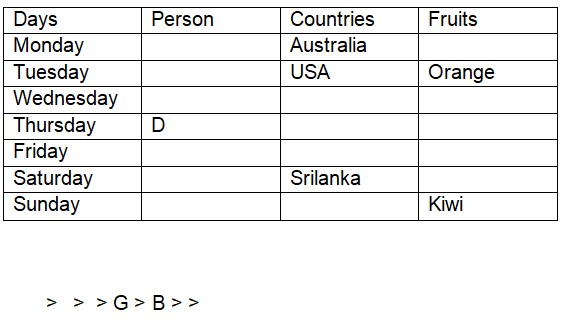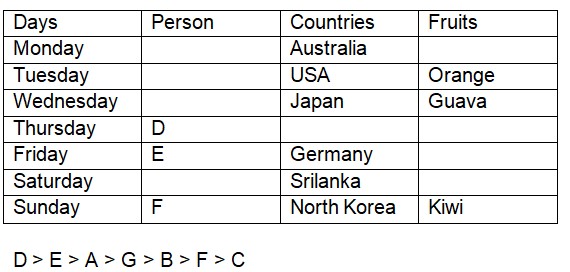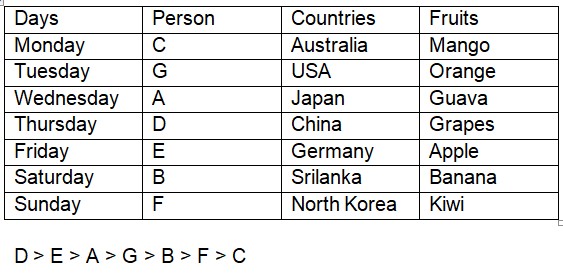Question
Which among the following likes grapes fruit?
Study the following information carefully to answer the given questions. Seven persons viz. A, B, C, D, E, F and G visit different countries viz., Australia, Srilanka, Germany, China, USA, Japan and North Korea on different days starting from Monday to Sunday. Also each of the person likes different fruits viz. Mango, apple, banana, orange, grapes, guava and kiwi. Also each of them is of different age. Neither E nor F is youngest. The one who visit Germany is sixth youngest. Only three persons visit the countries in between the one who likes orange and the one who visits Srilanka. The one who is youngest, visit Australia on Monday. The one who visits USA likes orange. A likes guava. Only three persons are older than G. The one who is sixth oldest visits North Korea but not on Friday. D visits the country on Thursday and is just older than E. The one who likes kiwi visits the country after maximum number of Persons. B is older than only two people. The one who visits Srilanka does not like kiwi and does not visit on Tuesday. A is older than both C and F but not the oldest. The one who visits Japan and likes guava, visits it immediately after the one who visit USA. One who likes banana visit immediately after the one who likes apple but not on Friday. The one who is youngest likes mango but not immediately after E. G neither visit Srilanka nor Japan.Solution
The one who is youngest, visit Australia on Monday. The one who likes kiwi visits the country after maximum number of Persons. Means the one who visits the country who likes kiwi visit the country on Sunday. Only three persons visit the countries in between the one who likes orange and the one who visits Srilanka. The one who visits USA likes orange. The one who visits Srilanka does not like kiwi and does not visit on Tuesday. D visits the country on Thursday. Only three persons are older than G. B is older than only two people.  A is older than both C and F but not the oldest. Neither E nor F is youngest. D visits the country on Thursday and is just older than E. So it is clear that D is the oldest and E will be 2nd oldest and C will be the youngest. The one who visits Germany is sixth youngest. The one who visits Japan and likes guava, visits it immediately after the one who visits USA. The one who is sixth oldest visits North Korea but not on Friday.
A is older than both C and F but not the oldest. Neither E nor F is youngest. D visits the country on Thursday and is just older than E. So it is clear that D is the oldest and E will be 2nd oldest and C will be the youngest. The one who visits Germany is sixth youngest. The one who visits Japan and likes guava, visits it immediately after the one who visits USA. The one who is sixth oldest visits North Korea but not on Friday.  One who likes banana visits immediately after the one who likes apple but not on Friday. The one who is youngest likes mango but not immediately after E. G neither visits Srilanka nor Japan. A likes guava.
One who likes banana visits immediately after the one who likes apple but not on Friday. The one who is youngest likes mango but not immediately after E. G neither visits Srilanka nor Japan. A likes guava. 
Which article of the Indian Constitution authorizes the president to seek an advice from the Supreme Court?
When was the Hindustan Republican Association formed?
The provision for disability compensations for the person, who is declared unfit after medical examination and for whom no alternate employment is possi...
What is the significance of August 23 as declared by the Government of India?
Which of the following are satellite ports?
What is the full form HAM?
What was the prime target of the first five-year plan of India?
Who won the Nobel Prize in Chemistry in 2022?
Whichof the following country launched The Shaheen-II supersonic missile is ?
India ranks _________ in the world production of pulses as on 2017-18.



